Li S.Z., Jain A.K. (eds.) Encyclopedia of Biometrics
Подождите немного. Документ загружается.


Latent Fingerprint
A fingerprint left on an object by touching it. Example
objects are glasses, doors, and tables.
▶ Biometric Identification
▶ Fingerprint Features
▶ Latent Fingerprint Experts
▶ Law Enforcement Agency
▶ Liveness Detection: Fingerprint
▶ Security and Liveness, Overview
▶ Universal Latent Workstation
Latent Fingerprint Experts
THOMAS A. BUS EY,BETHANY L. SCHNEIDER
Psychological and Brain Sciences; Program in
Cognitive Science, Indiana University, Bloomington
Indiana, IN, USA
Synonym
Latent fingerprint recognition
Definitions
Cognitive processing is the term given to mental effort
directed toward a particular problem. Cognitive science
is an umbrella term given to all disciplines that focus on
intelligent systems; research psychologists traditionally
focus on human performance. The field of cognitive
science includes mathematicians, computer scientists,
research psychologists, biologists, and philosophers.
Cognitive processing is closely linked to perceptual pro-
cessing and decision making, both of which are involved
in latent print examinations. As part of the science,
researchers typically collect data from experts and
novices to document how and when expertise develops.
▶ Latent fingerprint examiners are practitioners
who are trained to individualize or exclude latent
prints and prints from known sources (e.g., 10-print
cards). These practitioners often work with automated
databases such as IAFIS, which provide candidate
prints from known sources.
Introduction
Engineers attempt to solve a biometric problem by
isolating features or dimensions that they believe are
diagnostic, or use machine learning procedures to
identify a feature set that might be useful. Cognitive
scientists take the opposite approach. They use testing
procedures designed to infer the brain processes that
underlie performance in human experts. Under the
assumption that humans have the most flexible infor-
mation processing system and can use different levels
of information, this reverse engineering approach
holds the promise of improved quantitative analyses
of fing erprints. This entry summarizes the work that
has characterized performance in latent print exami-
ners, and describes how cognitive and vision scientists
design experiments to reveal the mechanisms under-
ling human latent print identification.
The study of expertise in latent print examiners is a
relatively new field, and only a few group has published
on the topic. However, there is a great deal of research
in related fields, and this research is described where it
applies to latent print examinations.
Empirical Evidence
Research on ▶ perceptual expertise in human experts
proceeds much in the same way that an engineer would
evaluate the performance of a biometric system .
Researchers generate candidate mechanisms that de-
scribe how an expert would accomplish a particular
task. These candidate hypotheses are based on an anal-
ysis of the information available, along with known
perceptual and memory constraints of humans. The
‘‘system’’ (in this case the human) is tested with a
recognition or memory task and performance measures
such as false match rate and false non-match rate can be
computed. Because the difficulty of a particular task
depends on the choice of materials, researchers often
compare performance from human experts against
those of human novices. Busey and Vanderkolk [1]
tested experts and novices in a fingerprint fragment
890
L
Latent Fingerprint
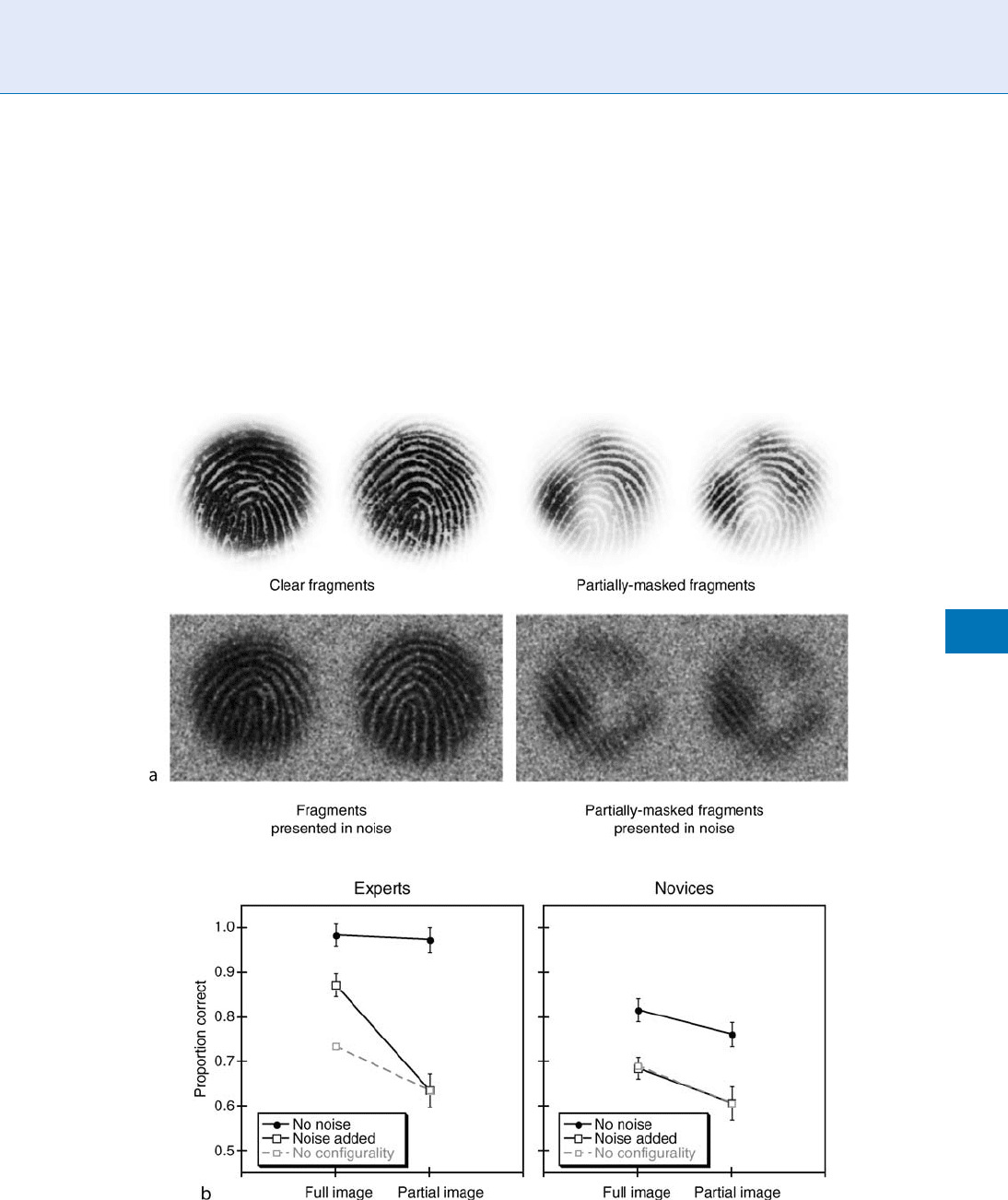
matching task that was one of the first major studies of
expertise in latent print examiners. Described below
are the details of this stud y, which not only illustrates
how experts differ from novices but provides an illus-
tration of how research question s are developed and
answered in Cognitive Science.
Stimuli such as those shown in Fig . 1 were pre-
sented briefly to expert latent print examiners and
novices. A single print would be shown for 1/5th of a
second, followed by a pattern mask for either 200 ms or
5 s. Then two prints would be shown, one of which
exactly matched the studied print fragment. The test
prints could either be whole or partially masked to
simulate a latent print, and could be presented with
or without noise (which simulates the fact that some
latent prints are recovered on textured or marked
surfaces which adds visual noise).
The data in Panel B of Fig. 1 illustrates several
factors. First, experts perform better than novices, a
difference that is even more pronounced at longer
Latent Fingerprint Experts. Figure 1 Panel A: Stimuli used to test novices and latent print examiners [1]. Panel B:
Empirical data demonstrating improved performance overall for experts, better performance in noise, and evidence for
configural processing (see text for details).
Latent Fingerprint Experts
L
891
L
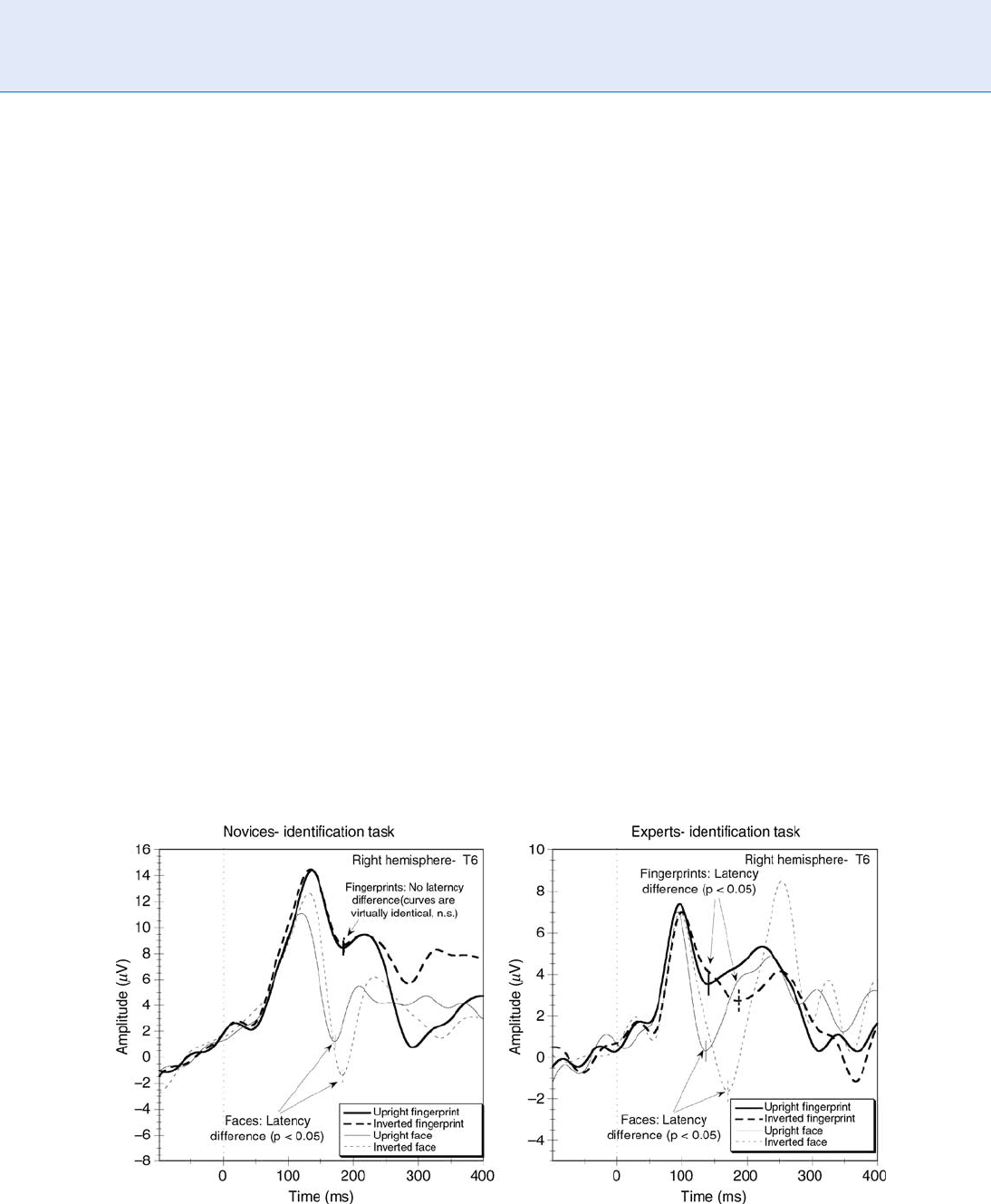
delays (not shown). This demonstrates that experts
may have better visual memories or the ability to
re-code visual information into verbal descriptions
which survive for longer intervals. Second, the struc-
ture of the design allows an investigation of
▶ config-
ural processing. The partially masked prints have
exactly half of the information in the full prints. Per-
formance from the partially masked prints can there-
fore be used to predict what performance should be in
the full print condition, using a model called probabil-
ity summation. The dashed lines show the prediction of
the probability summation model, and demonstrate
that experts exceed that prediction for the prints in
noise. This illustrates that experts are gathering more
information from the second half of the print once it is
added to the first half than one would have expected
based on their performa nce on the first half. Anothe r
way to view this is that for experts, the whole is greater
than the sum of the parts. One interpretation of these
results is that experts use the information from one
half to make better use of the information from the
second half when both are present.
Converging evidence for configural processing was
found using brain recording in a second experiment.
When visual stimu li are presented, neurons in the brain
fire and give off electrical activity than can be recorded
by placing electrodes on the surface of the scalp. This
form of electroencephalography (EEG) allows research-
ers to moni tor the ongoing brain activity that is elicited
by a visual stimulus. While this technique has only
coarse spatial resolution due to the spreading nature
of electrical charges, it has excellent temporal resolu-
tion, on the order of millisecond accuracy.
Researchers using this particular technology have
noted that stimuli that are known to be processed
using configural or holistic mechanisms such as faces
and similar trained stimuli provide a signature of
this configural processing [2]. Voltage recorded from
the head and averaged over lots of trials provides
the event-related potential (ERP), and faces produce
a very distinctive feature over the left and right parie-
tal regions of the brain. This feature is a downward-
trending component that has an inflection at about
170 ms after stimulus onset. Figure 2 illustrates this
feature, which has been termed the N170. When the
stimulus is inverted, which has the effect of reducing or
eliminating configural processing, the N170 is delayed
and slightly more negative-going.
This signature of configural processing provides a
means to test whether exper ts process fingerprints con-
figurally. Experts and novices were shown upright and
inverted faces and fingerprints. As expected, both
experts and novices show differences between upright
and inverted faces. However, only experts showed a simi-
lar pattern for fingerprints as they showed for faces: The
N170 for inverted fingerprints was significantly delayed
relative to upright fingerprints, but only in experts.
The dark curves in Fig. 2 illustrate this effect. These
Latent Fingerprint Experts. Figure 2 Electrophysiological data from Novices and Experts with upright and inverted
fingerprints and faces [1]. Light curves come from faces, while dark curves are from fingerprints (see text for details).
892
L
Latent Fingerprint Experts

findings are important because not only do they illus-
trate demonstrably different patterns of brain activity
in experts and novices, but the time course of the
differences are consistent with processing that happens
relatively early in visual processing. Thus these exam-
iners are experiencing relatively low-level changes in
their visual system that improve the quality of the
information and the way they interpret this perceptual
information.
In summary, the behavioral and electrophysiologi-
cal evidence from latent print examiners supports the
view that experts have better recognition overall for
fingerprints, they have better visual memories for fin-
gerprint informati on, and they process fingerprint
information in qualitatively different ways using con-
figural processing mechanisms.
Perceptual Expertise
While little research has focused specifically on latent
print examiners and the changes that develop as a result
of their expertise, candidate mechanisms that have been
previously discovered by cognitive scientists using
related materials can be extended. For example, the
idea of configural (using relational information between
parts) and/or holistic (obligatory processing of all the
parts of an object) processing has become a consistent
theme throughout the literature and many researchers
argue that it is a signature of expertise [3]. Specifically,
researchers studying perceptual expertise have devel-
oped paradigms that test for and illustrate a shift from
a feature-based system of object recognition (seeing
individual parts of an objects) to the use of holistic
and/or configural mechanisms [3]. These effects are
often illustrated in behavioral tasks that train subjects
on a specific stimulus type and then test these subjects
on either the studied or transformed configuration or
isolated parts. Post-training performance is often com-
pared with either their pre-training performance or
with novices (those who receive no training). The un-
derlying theme that results from these research para-
digms is that experts develop a holistic system which
causes them to be more sensitive to configurations and
be unable to ignore distractor parts of the stimulu s.
Apart from establishing configural and/or holistic
mechanisms, another key issue in exp ertise studies is
showing how experience with a domain causes a reor-
ganization of the visual recognition hierarchy away from
the basic level and to the subordinate level. In general
terms, subjects more readily identify items based on the
basic level category membership (e.g., bird, table) rather
than their subordinate membership (e.g., robin, coffee
table) [4]. This hierarchy is structured to reflect the
prominent use of basic-level information over the sub-
ordinate level information. However, a series of experi-
ments has shown that the development of expertise
results in enhanced subordinate level identification
[5]. It has been proposed that (1) expertise causes a
shift in the hierarchy to the subordinate level rather
than the basic level, (2) experts make identifications
based on this subordinate level information, and
(3) their expertise allows them to be equally proficient
in making identification on the subordinate and basic
level. The proficiency in which experts use this subor-
dinate level information has been reliably replicated
and has been argued to be a signature of expertise.
Other studies have researched differences between
experts and novices in terms of how expertise impac ts
▶ visual memory, the ability to use verbal redescrip-
tions, and attention to particular features. For exam-
ple, previous stud ies on expertise have implicated
enhanced visual memory for expertise items, and
showed that chess masters were able to accurately
reproduce VALID board configurations after viewing
them for only 5 s [6]. This is arguably due to their
extensive knowledge of specifi c patterns that results
with expertise in the domain. Such an idea can be
applied to latent print examiners and has also been
reported for experts in other domains such as bridge
players [7], music students [8], and electronics techni-
cians [9]. In addition, this idea can be extended into
the category learning literature by a finding that shows
increases in memory sensitivity account for the ability
to learn to uniquely identify similar objects [10].
This enhanced memory ability could also be linked to
an enhanced ability to fixate on features that are the
most informative for future identification, an idea that
is also supported in the category learning literature [11].
In addition to visual memory, research in the per-
ceptual categorization literature argue that experts de-
velop a more robust storage, such as implicit verbal
redescriptions, in the process of specializing in a cate-
gory. Specifically, experts appear to garner more verbal
knowledge about a domain but make categorizations
without explicit deliberations [12].
Research with radiologists suggests that expertise
may alter what types of perceptual information are
Latent Fingerprint Experts
L
893
L

allowed for consideration. Specifically, experts argu-
ably attenuate to specific task relevant dimensions
[13]. More generally, this idea has also been founded
in the category learning literature by showing that
category learning includes learning how to optimally
allocate attention to those features relative to the cate-
gory and/or task and discard unrelated features [11].
Decision Making and Decision Biases
Expertise brings special abilities, but it also can lead
to special vulnerabilities. Several studies conducted
by Itiel Dror and co-workers illustrate the role that
context plays in decisions about fingerprint individua-
lizations. This can bring about
▶ contextual biases.
The difficulty with latent print examinations is that
the judgment that two prints come from the same
source is essentially based on similarity. Even if one
source (say a fingerprint) maintains a persistent struc-
ture over time, the way that print is laid down can
greatly affect its appearance. Thus no two impressions
of a single source will look identical. Clear prints
might look very similar, but in the end individualization
essentially comes down to a judgment that two prints
look more similar than any close non-match that
the examiner has seen. Such a task has three possible
decisions (individualization, exclusion, or insufficient
detail to make a determination). A particular pair of
prints will produce some amount of evidence for each
of these decisions, but whether the evidence exceeds
some internal threshold depends on the individual
examiner. Dror et al. explored the possibility that
the details of the case (the context) might affect the
decision process.
In the first study [14], non-experts where shown
pairs of fingerprints and given additional (fictitious)
details about the case. When the prints were shown
with a highly emotional context such as an accident
scene picture or a murder victim, the stimulus affected
the decision made by subjects. Subjects were more
likely to report a matching fingerprint pair when the
context was emotional. This suggests that contextual
information beyond the particular fingerprint percep-
tual information plays a role in latent print examina-
tions, at least with novices.
To extend this to experts, two additional studies
used covert measures to assess the role of context with
examiners during their normal workflow [15, 16 ].
To highlight the importance of this work, consider
the task of an examiner. He or she must evaluate the
perceptual evidence and decide whether there is suffi-
cient evidence to make a decision. What constitutes
‘‘sufficient’’ is of course of primary importance. Re-
search psychologists refer to this task as a criterion-
based (as opposed to a criterion free) judgment, since
the decision outcome is based in part on the criterion
that the examiner establishes. If the examiner allows
additional details about the case that are irrelevant to
the particular identification at hand to influence their
criterion, they reduce value and independence of the
latent print examination.
In this particular set of studies, latent prints
from closed casework were given again to the same
experts under the guise of a new case. These prints
had previously been matched or excluded by the
examiners. Dror and his colleagues found that 8 out
of 11 experts made a decision that was inconsistent with
their previous decisions on the identical pairs of prints.
Most of the switched decisions occurred with difficult
prints that were previously judged as identifications,
although some of these easy identifications also had
changed answers. The details of these experiments
are complex, and the reader is referred to the ori-
ginal sources for full details [17], but the implications
are clear: context can play a role in the decision that
an examiner makes, and care must be taken not
to allow external influence to affect the perceptual
judgment.
Summary
Research on latent print examiners has demonstrated
increased recognition of latent prints and the flexibility
to rely on different levels of print information. These
differences are supported by superior visual memory
and different styles of process. The EEG data suggest
that training and experience are causing changes in
relatively early and low-level areas of the visual system
that improve the quality of the perceptual information.
A host of related studies suggest that experts may learn
to re-code visual information into verbal descriptions,
and learn to attend to the most relevant and diagnostic
regions of a print. However, with these increased abil-
ities may come increased vulnerabilities such as con-
textual biases that may affect the interpretation of a
fingerprint pair.
894
L
Latent Fingerprint Experts

Related Entries
▶ Fingerprint Classification
▶ Fingerprint Matching, Manual
▶ Fingerprint Recognition, Overv iew
▶ Law Enforcement
▶ Multiple Experts
▶ Psychology of Gait and Action Recognition
References
1. Busey, T.A., Vanderkolk, J.R.: Behavioral and electrophysiologi-
cal evidence for configural processing in fingerprint experts. Vis.
Res. 45, 431–448 (2005)
2. Rossion, B., Gauthier, I.: How Does the Brain Process
Upright and Inverted Faces? Behav. Cogn. Neurosci. Rev. 1,
63–75 (2002)
3. Bukach, C.M., Gauthier, I., Tarr, M.J.: Beyond faces and mod-
ularity: The power of an expertise framework. Trends Cogn. Sci.
10, 159–166 (2006)
4. Rosch, E., Mervis, C.B., Gray, W.D., Johnson, D.M., Boyes-
Braem, P.: Basic objects in natural categories. Cogn. Psychol.
8, 382–439 (1976)
5. Tanaka, J.W., Taylor, M.: Object categories and expertise: Is the
basic level in the eye of the beholder? Cogn. Psychol. 23, 457–482
(1991)
6. Chase, W.G., Simon, H.A.: Perception in chess. Cogn. Psychol.
4, 55–81 (1973)
7. Charness, N.: Components of skill in bridge. Canad J Psychol.
33, 1–16 (1979)
8. Beal, A.L.: The skill of recognizing musical structures. Memory
Cogn. 13, 405–412 (1985)
9. Egan, D.E., Schwartz, B.J.: Chunking in recall of symbolic draw-
ings. Mem. Cogn. 7, 149–158 (1979)
10. Nosofsky, R.M.: Attention and learning processes in the identi-
fication and categorization of integral stimuli. J Exp Psychol
Learn, Mem. Cogn. 13, 87–108 (1987)
11. Zhang, L., Cottrell, G.W.: A computational model which learns
to selectively attend in category learning. Proceedings of the
2005 International Conference on Development and Learning,
vol. 19. pp. 195–200
12. Johansen, M.K., Palmeri, T.J.: Are there representational
shifts during category learning? Cogn. Psychol. 45, 482–553
(2002)
13. Sowden, P.T., Davies, I.R.L., Rolings, P.: Perceptual learning of
the detection of features in X-ray images: A functional role for
improvements in adults’ visual sensitivity? J. Exp. Psychol.:
Human Percep. Perform. 26, 379–390 (2000)
14. Dror, I.E., Peron, A.E., Hind, S.L., Charlton, D.: When emotions
get the better f us: The effect of contextual top-down processing
on matching fingerprints. Appl. Cogn. Psychol. 19, 799–809
(2005)
15. Dror, I.E., Charlton, D.: Why experts make errors. J. Forensic
Identif. 56, 600–616 (2006)
16. Dror, I.E., Charlton, D., Peron, A.E.: Contextual information
renders experts vulnerable to making erroneous identifications.
Forensic Sci. Int. 156, 74–78 (2006)
17. Dror, I., Rosenthal, R.: Meta-analytically Quantifying the Reli-
ability and Biasability of Forensic Experts. J. Forensic Sci. 53,
900–903 (2008)
Latex Finger
▶ Fingerprint Fake Detection
Law Enforcement
KEN MOSES
Forensic Indentification Services, San Franscisco, USA
Synonyms
Criminal law enforcement; Law enforcement agency;
Police law enforcement
Definition
Law enforcement systems record information about
individuals, both biometric data and demographic
data, that is used for quickly identifying criminals
and their acts.
Introduction
The identification of criminals and repeat offenders
has been one of the primary missions of police agencies
since their creation in the nineteenth century. The
industrial revolution led to mass migration to cities
where anonymity gave safe harbor to lawbreakers.
Newspapers fanned both real and perceived threats to
public safety and placed persistant demands upon the
police to solve crimes. Laws were enacted that dealt the
Law Enforcement
L
895
L
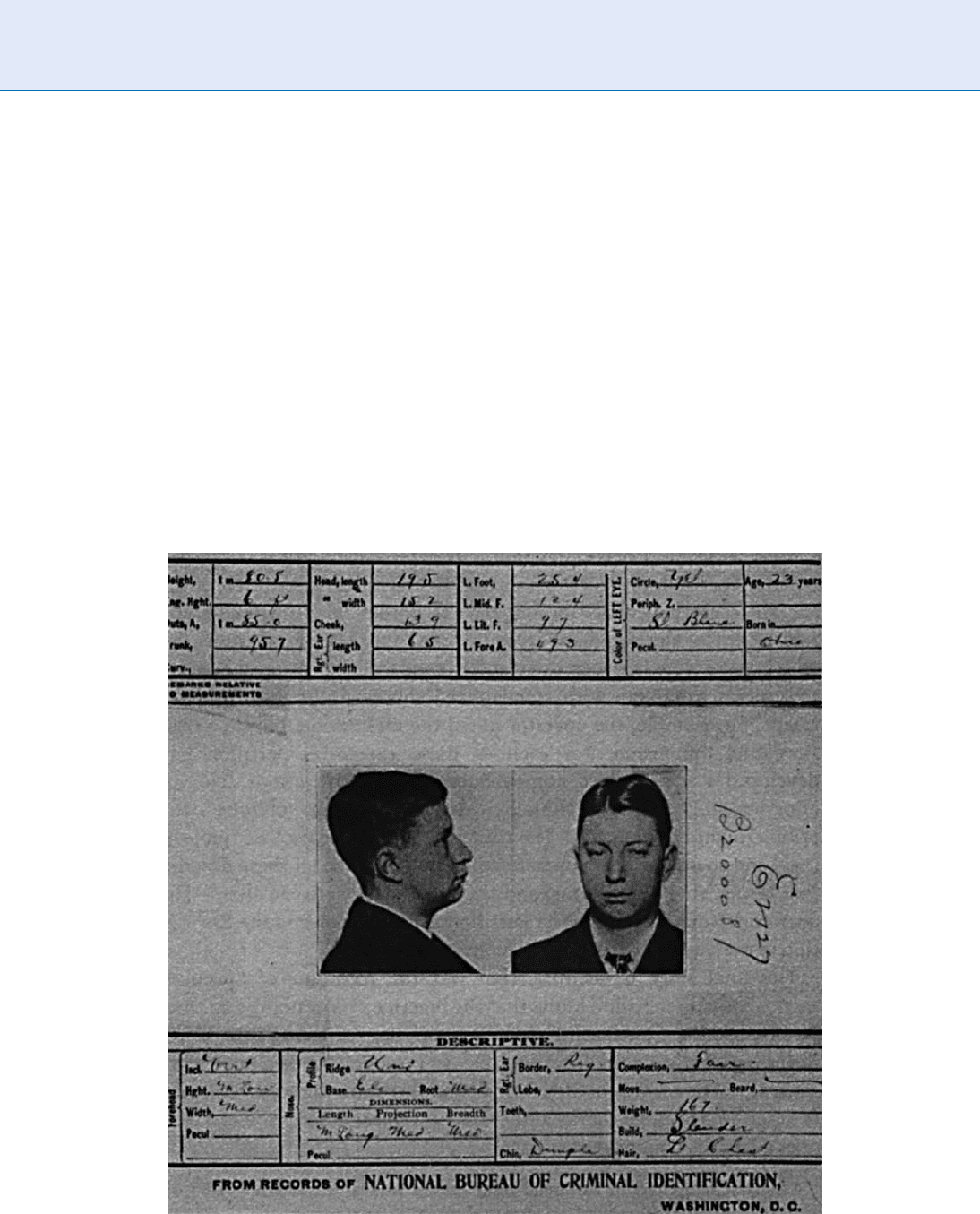
harshest penalties to repeat offenders encouraging law-
breakers to adopt a different name (known as an alias)
with each new arrest.
Answering the call for effective systems of identifi-
cation, law enforcement agencies initiated various sys-
tems to maintain records at the end of the nineteenth
century. One of the earliest techniques utilized the new
science of photography to take pictures or mug shots at
the time of arrest. These mugs shots were organized
into albums, called Rogues Galleries. The method of
recording these photographs was adopted and standar-
dized worldwide to include a front and profile view of
the subject. General physical descriptions, including
scars, marks, and tattoos accompanied the photographs.
Today, Rogues Galleries have evolved into large digitized
databases of mug shots from which investigators can
select possible suspects based on victims’ descriptions,
or compile ‘‘six packs’’ of persons sharing similar
descriptions for use in photo line-ups [1]. Automated
facial recognition would be a natural extension of the
mug shot systems, and research is underway to build
that capability into the system that would be most
valuable in video surveillance cases.
In 1880, Alphonse Bertillon, a clerk in the Paris
police, devised an anthropomorphic system of identi-
fication based upon 18 body measurements utilizing
specialized rulers and calipers for precision. From these
measurements, Bertillon derived a numeric value or
‘‘portrait parle,’’ that was supposedly unique to each
person. Bertillon’s Portrait Parle met with great success
in identifying repeat offenders regardless of what
names they had assumed at the time of arrest. Within
a decade, this manual biometric system was in use in
police agencies worldwide (Fig. 1).
Law Enforcement. Figure 1 Early police biometrics circa. 1906 Bertillon ‘‘Portrait Parle’’ record.
896
L
Law Enforcement
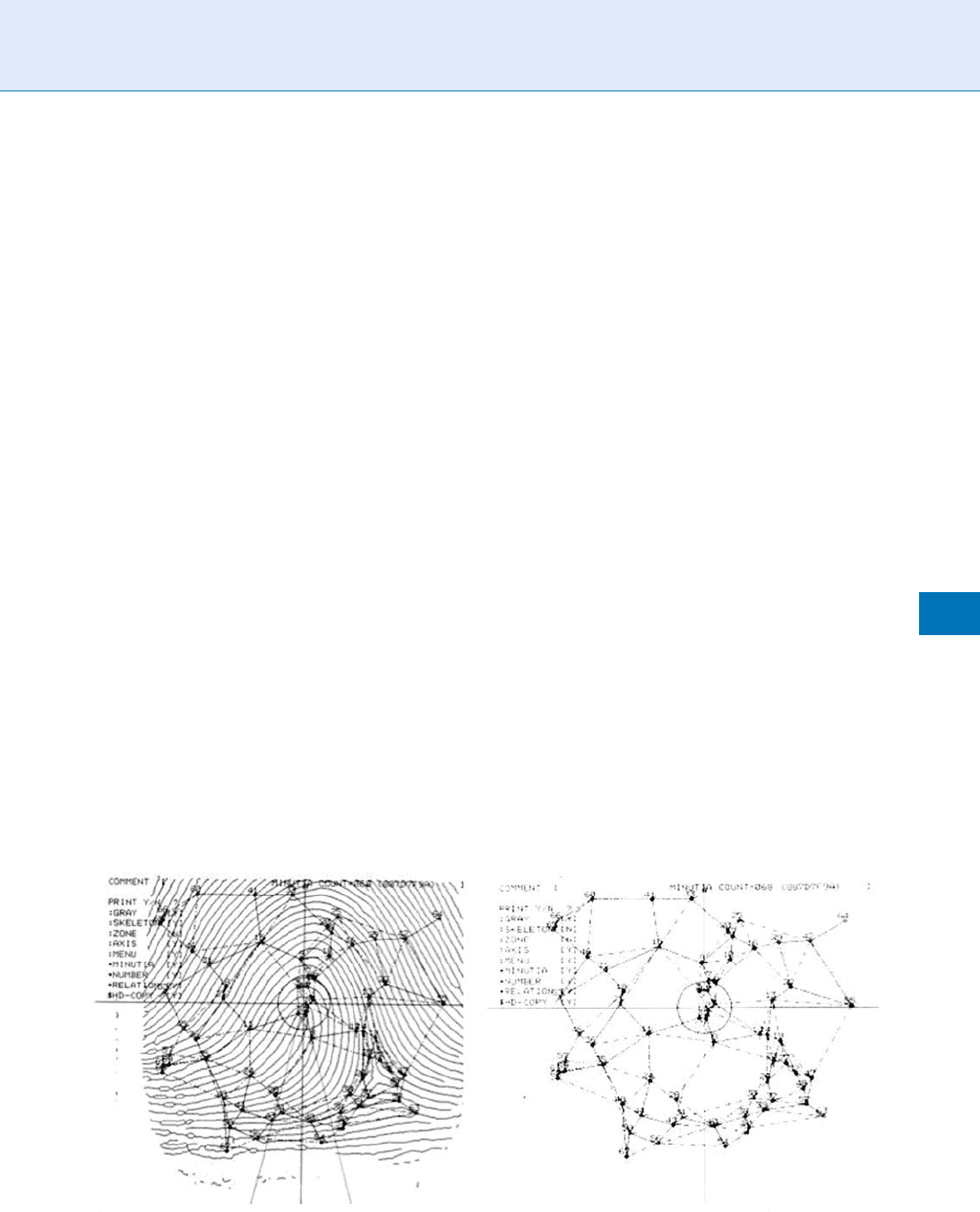
During this period, a new type of biometric
was being explored by William Herschel in India and
Dr. Henry Faulds in Japan. In 1892, Francis Galton,
the nephew of Charles Darwin, published Finger
Prints [2], a book that became the standard reference
on the subject. Sir Edward Henry, police commissioner
in Bengal India, devised a classification system that
allowed for easy search and retrieval of fingerprints.
The Henry System was later adapted by Scotland
Yard in 1901. For several years, police agencies around
the world utilized both the Bertillon Portrait Parle
and fingerprinting systems side by side until finger-
prints won out and Portrait Parle was largely aban-
doned. Fingerprints proved easier to record, fil e, and
retrieve, and they could be used to solve crimes when
they were inadvertently left by criminals at the scene of
crime [3].
Today, as with mug shots, fingerprints are usually
digitally recorded, stored, and automatically searched
by Automated Fingerprint Identification Systems
(AFIS) [4]. AFIS has become the backbone of criminal
identification and is the most widely used biometric
system in the world. Standards have been adopted
for the digital storage and transmission of fingerprint
images [5].
In Finger Prints, Galton highlighted a number of
characteristics of each fingerprint that are used to
uniquely identify it. Modern automated systems use
some of these Galton characteristics in extracting in-
formation from the print (Fig. 2).
Fingerprint Functions in Law
Enforcement
Law enforcement AFIS systems are composed of two
interdependent subsystems: the tenprint or criminal
ID subsyste m, and the latent or criminal investigation
subsystem. Each subsystem operates with a consider-
able amount of autonomy, and both are vital to public
safety.
The Tenprint subsystem is tasked with identifying
sets of inked or scann ed fingerprints incident to an
arrest or citation or as part of the applicant process to
determine whether or not the person has an existing
record. An automated tenprint search usually involves
a search of only two or four fingers. Submitted finger-
prints by and large have sufficient clarity and detail to
make searching of more than two fingers redundant. At
present the AFIS can return a search of one million
records in under a minute.
The latent print or criminal investigation subsys-
tem is tasked with solving crimes through the identifi-
cation of latent prints developed from the scene of
crime. Terminals used within the latent subsystem
are often specialized to accommodate the capture
and digital enhancement of individual latent prints
(Fig. 3).
The search of a latent print is more tedious and
time consuming than a tenprint search. Latent prints
are often fragmentary and of poor image quality.
Minutiae features must be reviewed by a latent print
Law Enforcement. Figure 2 Computer plotting of minutiae or Galton details from a fingerprint.
Law Enforcement
L
897
L
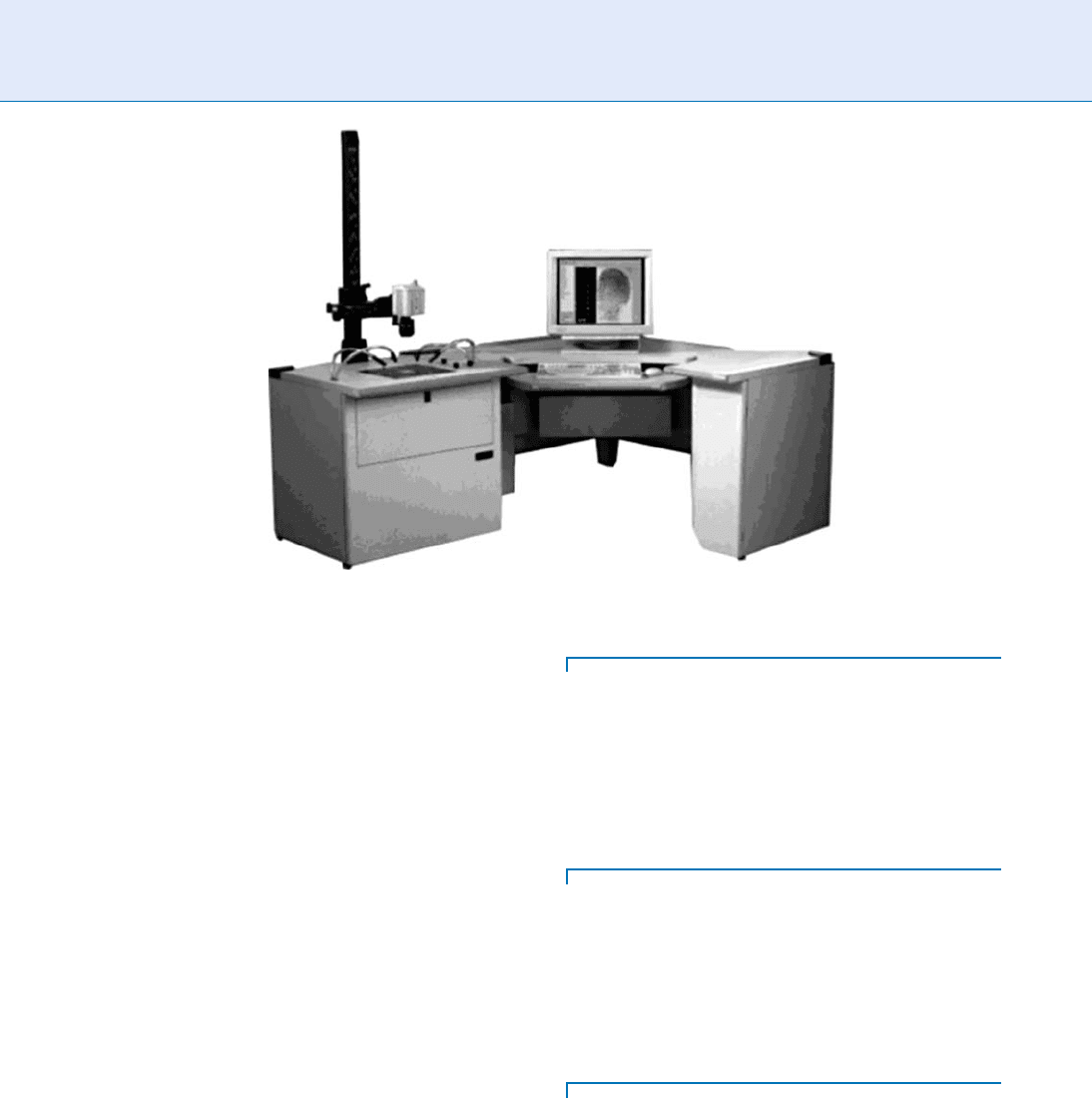
examiner one by one before the search even begins.
Once the search is launch ed, the AFIS searches the
database and returns a respondent list of the closest
matches [6–8]. The fingerprint examiner then com-
pares each candidate against the search print.
The id entification of latent fingerprints from the
scenes of crime has been a tremendous boon to law
enforcement agencies. AFIS identifications, or hits, are
responsible for solving hundreds of thousands
of crimes each year throughout the world. In 2005,
in the United States alone, 50,000 cases were cleared
by AFIS hits.
References
1. The Criminal Investigative Process; Rand, R-1776-DOJ; October
(1975)
2. Galton, F.: Finger Prints. Macmillan, London (1892)
3. Cole, S.: Suspect Identities. Harvard University Press,
Cambridge, MA (2001)
4. Lee, H.C., Gaensslen, R.E.: Advances in Fingerprint Technology,
2nd edn. CRC Press, West Palm Beach, FL (2001)
5. Data Format for the Interchange of Fingerprint, Facial, & Scar
Mark & Tattoo (SMT) Information (ANSI/NIST-ITL 1-2000)
6. Komarinski, P.: Automated Fingerprint Identification Systems.
Elsevier, Amsterdam (2005)
7. Ratha, N., Bolle, R.: Automated Fingerprint Recognition Sys-
tems. Springer, New York (2004)
8. Maltoni, D., et al.: Handbook of Fingerprint Recognition.
Springer, New York (2003)
Law Enforcement Agency
▶ Law Enforcement
LBP (Local Binary Pattern)
▶ Local Image Filters
LCN DNA/Low Template Level
Low template level or as formally referred to as Low
Copy Number (LCN) DNA refers to the analysis of
trace amounts of DNA (typically less than 100 pg). As
LCN is an ultrasensitive technique, there are artefacts
that one must be aware (allele drop-in and drop-out).
It requires careful interpretation and very strict proto-
cols to avoid contamination.
▶ Forensic DNA Evidence
Law Enforcement. Figure 3 Latent fingerprint workstation.
898
L
Law Enforcement Agency

LDA (Linear Discriminant Analysis)
Linear discriminant analysis is defined as an orthogo-
nal linear transformation that best separate two or
more classes of objects. It finds the set of the projection
vectors which maximize the ratio of between-class
scatter against within-class scatter. The resulting com-
bination may be used for classification.
▶ Face Variation
▶ Illumination Compensation
▶ Linear Dimension Reduction
LED (Light Emission Diode)
LED refers to an electronic component, Light Emission
Diode, which emits light when traversed by a current
of certain entity.
A light-emitting diode, also called an LED, is a
semiconductor diode that converts electric energy into
electromagnetic radiation at a visible and near infrared
frequencies when its p–n junction is forward biased.
▶ Biometric Sensor and Device, Overview
▶ Face Recognition, Near-infrared
Lighting Compensation
▶ Illumination Compensation
Lighting Model
The realism of a computer generated visual scene
depends on the extent to which lighting phenomena
are mimicked by the lighting model used. In Computer
Graphics, the lig hting model refers to the choice of
reflectance function used. However, in Computer Vi-
sion, it may also include the t ype of light source(s) and
of normals used, as these have a considerable effect on
the synthesis and on the analysis by synthesis results. A
reflectance function is a mathematical function that
describes how light is reflected from an object.
▶ Face Sample Synthesis
Likelihood Ratio Test
The likelihood ratio test results from simplifying the
ratio between the probability that the sensor’s observa-
tion resulted from the positive hypothesis (genuine
user) divided by the probability that the sensor’s ob-
servation resulted from the negative hypo thesis (im-
poster). The objective is to improve the ratio by
making the probability distributions separate as
much as possible. If the distributions are far apart,
the probability that the observation came from the
genuine user increases, and the probability that the
observation came from the imposter decreases. This
increases the ratio improving the test.
▶ Fusion, Decision Level
Limbus
The limbus is the outer boundary of the annular iris
structure, where the iris meets the white portion of the
eye, the sclera.
▶ Iris Image Data Interchange Formats, Standardization
Linear Dimension Reduction
WEI-SHI ZHENG
1
,J.H.LAI
1
,PONG C. YUEN
2
1
Sun Yat-sen University, Guangzhou, P.R. China
2
Hong Kong Baptist University, Hong Kong, China
Synonym
Linear feature extraction
Linear Dimension Reduction
L
899
L
